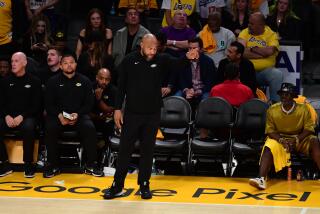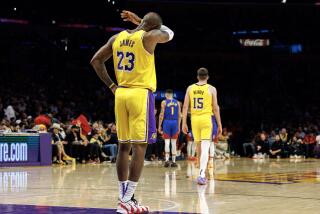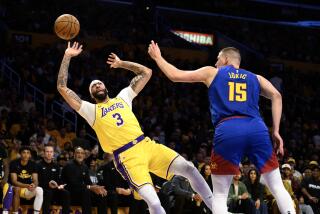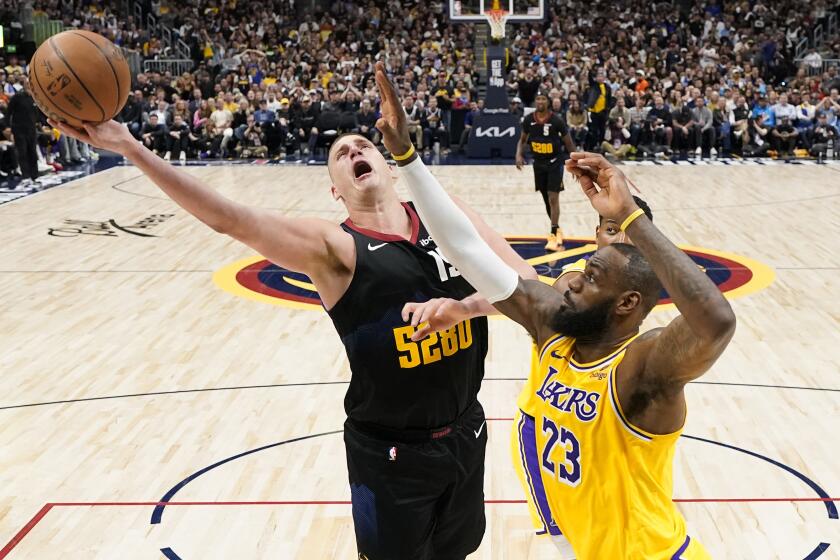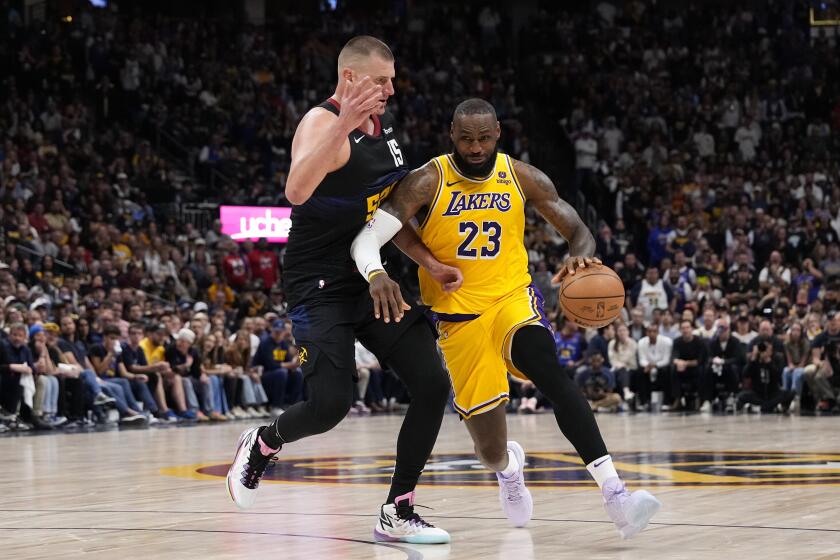SAN ANTONIO 112 LAKERS 111
Derek Fisher and the San Antonio Spurs, forever linked by the “0.4” shot that ricocheted around Texas back in 2004, intertwined yet another time, though this was less favorable for the Lakers.
Fisher was called for a foul with 10.5 seconds to play, helping Roger Mason complete a three-point play that gave San Antonio the lead for good in a 112-111 victory Wednesday at AT&T; Center.
It was a game the Lakers should have lost because of their early-game sloppiness, and then it became a game they should have won after a furious fourth-quarter comeback.
In the end, after Trevor Ariza was called for a controversial traveling call with 0.8 of a second to play, the fraction of a second didn’t bounce the Lakers’ way quite like it did back when Fisher was still in his late 20s and Shaquille O’Neal was still in the middle.
Forget the Texas two-step. The last couple of plays became a two-stumble.
“That’s the least we can do to return the favor after Fish ‘0.4’ed them,” Kobe Bryant said. “Hopefully [the Spurs] got it out of their system so when the playoffs come around, they don’t have any more bullets left.”
For a brief time, the Lakers looked like the last ones standing in Wednesday’s shootout.
Down a point, Bryant’s long three-pointer gave them a 111-109 lead with 12.9 seconds left.
But then Mason took an inbounds pass on the baseline after a timeout and was fouled by Fisher as he made a 16-footer. The free throw gave the Spurs a 112-11 lead.
Some Lakers officials thought Mason created the collision by kicking out his leg after Fisher went for a steal and wheeled around after failing to get it.
Fisher wasn’t sure what to think.
“They called a foul. It is what it is,” he said. “I haven’t seen it, so I guess I can’t really comment on it fairly or unfairly.”
The Lakers were even less enamored of the last-second play involving Ariza.
They agreed that there should have been a call on the play, but it should have been tripping on Manu Ginobili, not traveling on Ariza.
“That was a call that wasn’t made,” Jackson said.
Said Ariza: “Everybody wants at least a chance. To get a call like that, that’s kind of a tough one. But that’s the call he made and you can’t argue with him.”
The Lakers had two timeouts left after Mason’s three-point play but charged ahead without using one. Bryant had the ball on the left wing, saw a double-team coming and passed to Ariza near the top of the key.
“I could have rose up and shot it myself, but I felt like if one of my teammates, particularly Trevor, to get that opportunity just to drain a shot or something like that, he just takes his game to a whole ‘nother level,” Bryant said. “It just didn’t work out.”
The last time the Lakers were here, they served up a wire-to-wire 93-91 victory in Game 4 of last season’s Western Conference finals. The Lakers then clinched the series in Game 5 in Los Angeles.
The Lakers did something similar back in 2004, when Fisher’s turnaround in the conference semifinals sent the Lakers back home with a 3-2 series lead, which quickly became 4-2.
On Wednesday, the Lakers (31-7) merely fell behind Cleveland (30-6) for the league’s top record.
They were pretty much a mess in the first half.
They coughed up two fastbreak opportunities, Ariza was called for fouling George Hill on a three-pointer with .01 left in the first quarter, and Bryant had his pocket picked blindside by Ginobili twice.
Jackson had definitely seen enough of the follies, shaking his head in frustration and chuckling after a timeout had been called near the end of the second quarter.
And yet, the Lakers were down only 63-61.
They could thank Pau Gasol, who made eight of nine shots and had 17 points by halftime. Gasol finished with 21 points. Bryant had 29 points and 10 assists.
The Lakers trailed, 102-91, with 6:55 to play but managed to make a game of it. They just didn’t make a victory out of it.
“That was a great comeback,” Jackson said. “That was a big game for us. We won it in everything but the free-throw line.”
--
More to Read
All things Lakers, all the time.
Get all the Lakers news you need in Dan Woike's weekly newsletter.
You may occasionally receive promotional content from the Los Angeles Times.
